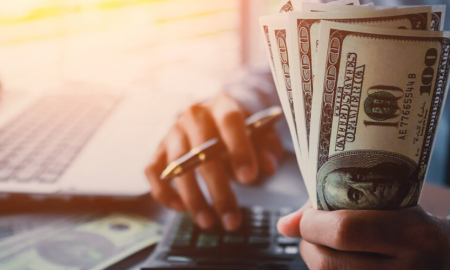
Giant Car Retailer Carvana ‘Tightens’ Its Lending Rules Amid Rise in Delinquencies

In the wake of rising delinquencies, online car retailer Carvana has made significant adjustments to its lending rules. The company is becoming more selective about its borrowers, resulting in higher interest rates for many customers. This shift has left many wondering: Why is Carvana interest rate so high?

Auto Hub / Carvana Chief Financial Officer Mark Jenkins tells Bloomberg in an exclusive report that the company is becoming more selective about who lends to.
Carvana’s recent changes in its lending policies can be traced back to several key factors. The first and foremost is the surge in delinquencies across the auto industry. As more borrowers fail to make timely payments, lenders like Carvana are forced to reassess their risk management strategies. Higher interest rates are one way to mitigate the increased risk of loan defaults.
The Impact of Industry-Wide Delinquencies
Delinquencies have been on the rise, affecting many sectors, including the auto industry. Carvana, like other lenders, has felt the pressure of this trend. When borrowers start missing payments, the risk associated with lending increases. To counter this, Carvana has tightened its lending rules, making it harder for less creditworthy individuals to secure loans.
This tightening of standards means that only those with higher credit scores and more stable financial situations are likely to be approved. However, even these borrowers are facing higher interest rates. This is a precautionary measure to ensure that Carvana remains financially stable amidst uncertain economic conditions.
The Financial Challenge of Carvana After the Pandemic
Carvana’s financial challenges have also played a significant role in the decision to raise interest rates. In 2023, the company reported a net debt of $5.1 billion and interest payments amounting to $632 million. These figures highlight the substantial financial burden the company is carrying.

Peeps / Last year Carvana reported a net debt of $5.1 billion and interest payments of $632 million.
To manage this debt effectively, Carvana needs to ensure a steady stream of revenue. One way to achieve this is by increasing the interest rates on their loans. Higher interest rates mean higher monthly payments, which can help Carvana manage its debt obligations more effectively.
Why is Carvana Interest Rate So High?
So, why is Carvana interest rate so high? For Carvana, higher interest rates serve as a critical risk mitigation strategy. By charging more interest, the company can offset potential losses from borrowers who might default on their loans. This approach helps Carvana maintain its financial health while continuing to offer financing options to customers.
However, this strategy also means that customers need to be more financially prepared to handle higher payments. Those who are unable to meet these new standards may find themselves unable to secure financing through Carvana, pushing them to look for alternatives.

Telly / Per the report, higher interest rates and the rising cost of used cars are the major reasons why Carvana is tightening its lending standards.
The automotive market has seen a significant increase in the cost of used cars. Several factors contribute to this trend, including supply chain disruptions and increased demand. As the cost of cars rises, the loan amounts that customers need also increase.
Higher loan amounts naturally lead to higher interest rates. Lenders, including Carvana, need to protect themselves against the larger sums of money at risk. Thus, the interest rate customers face is a reflection of the higher costs associated with the vehicles they are purchasing.
Carvana’s Chief Financial Officer, Mark Jenkins, highlighted in a Bloomberg report that the company is becoming more selective about who they lend to. This selectivity ensures that Carvana is lending to individuals who are more likely to repay their loans, reducing the risk of defaults.
More inTrade & Markets
-
How to Make Money on TikTok – 8 Proven Strategies
TikTok isn’t just a platform for viral dance challenges and funny skits anymore. It’s a goldmine of opportunity for creative minds...
June 6, 2024 -
Tech Giant Cisco Likely to Lay Off ‘Almost 350’ Employees As Part of Its ‘Restructuring Plan’
Is your favorite tech company feeling the pinch? Recent reports suggest that Cisco (CSCO) is planning to lay off ‘almost 350...
May 31, 2024 -
How Many Mortgages Can You Have? Understanding the Limits
Are you pondering the idea of delving into the realm of multiple mortgages? Whether it’s for expanding your property portfolio, securing...
May 23, 2024 -
What You Ought to Know About Dominican Republic Rum
When you think of the Dominican Republic, your mind might drift to images of beautiful beaches and vibrant dance rhythms. But...
May 16, 2024 -
Are Mobile Homes Worth Investing? A Deeper Look
Are mobile homes a good investment? This question often pops up among potential homeowners and investors alike, looking for an affordable...
May 9, 2024 -
10 Best Stocks to Invest in 2024 for Smart Investors
In a world where economic growth seems to be hitting the brakes, the hunt for the best stocks to invest in...
April 30, 2024 -
Will Breaking a Lease Affect Your Credit? The Real Impact
Breaking a lease isn’t just about packing up and moving on; it’s a decision that can have lasting financial implications. While...
April 23, 2024 -
Is Traveling a Hobby? Exploring the Reasons and Ways to Travel More
Have you ever scrolled through social media and stumbled upon the question, “Is traveling a hobby?” It’s a thought-provoking query that...
April 16, 2024 -
Who Owns the Playboy Mansion? Revealing the Current Owner
The story of the Playboy Mansion is as intriguing as the parties it once hosted. Nestled in the heart of Los...
April 9, 2024















You must be logged in to post a comment Login